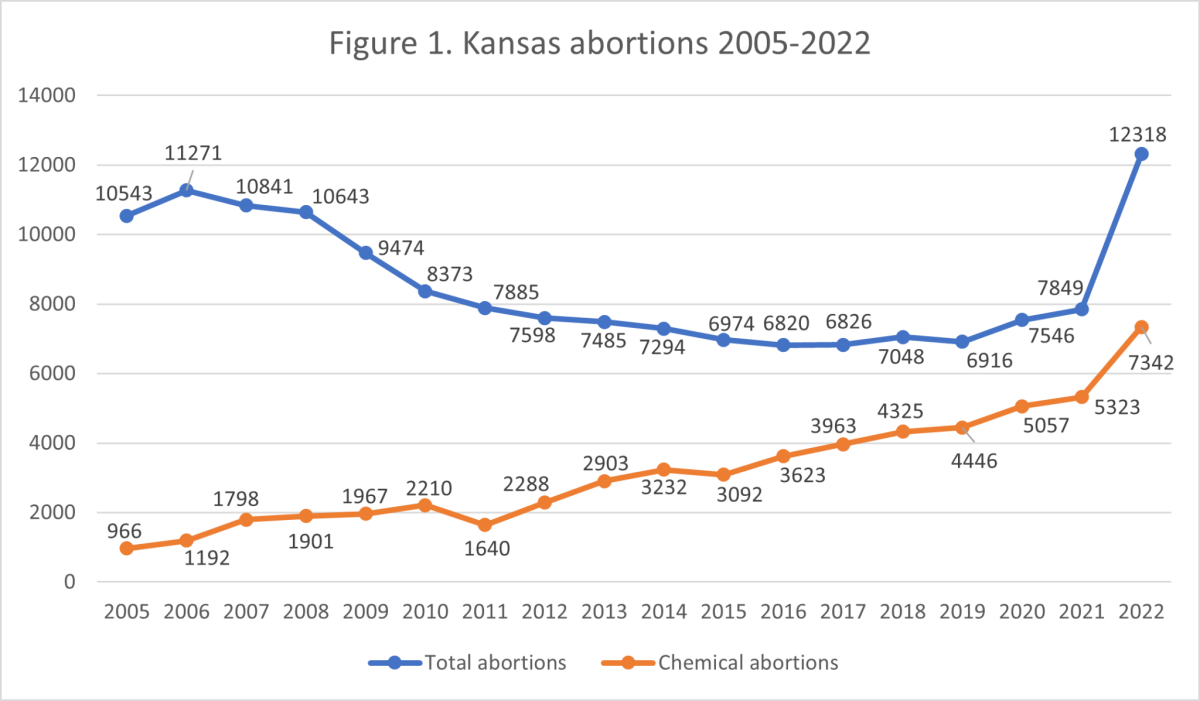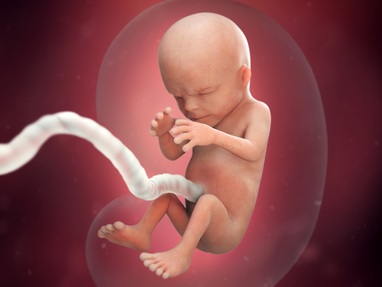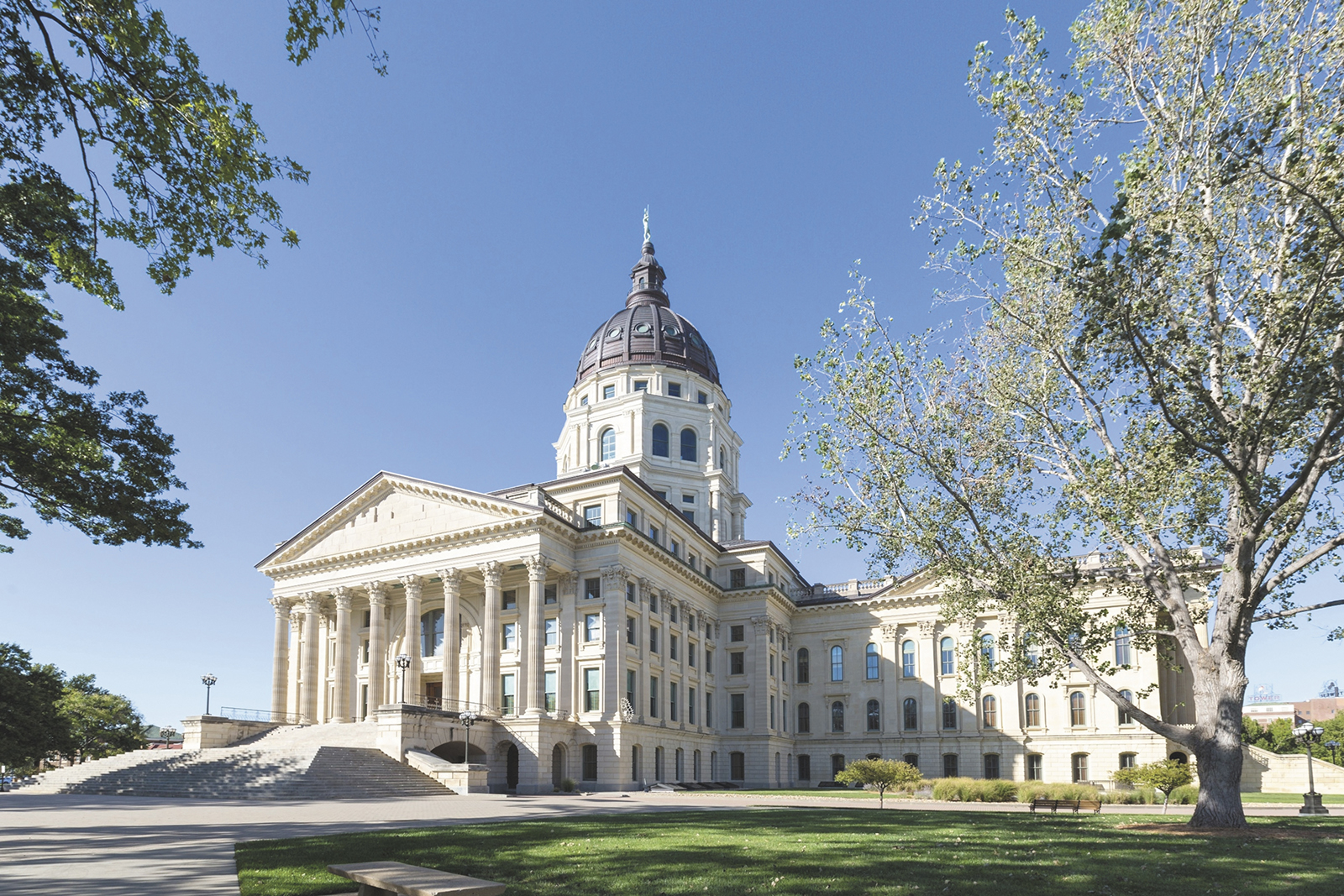TOPEKA – In a year with a record number of fetus killings and Kansas’ newly established role as an abortion tourism destination in the Midwest, the Sunflower State may have logged so many abortions in 2023 that state officials are delayed in tallying them.
Two years after the fall of Roe v. Wade and the remanding of abortion jurisdiction to the states and away from the federal government, analysts say more than a million fetuses were killed nationwide in 2023.
Kansas likely set a record as well.

If correct, those numbers are a historic high– and the sheer volume of those deaths could be one reason why Kansas Department of Health and Environment officials aren’t releasing preliminary abortion statistics this spring as they have since as far back as 1999.
KDHE told the Topeka Capital Journal last week that preliminary annual statistics on abortion typically released in the spring would not be released this year until late the fall. The full state vital statistics report for 2022 wasn’t released until December 2023, so any hint on those number may be six months from now.
Such a delay in 2024 would put the release of those numbers taking place after the November general elections, when all 125 Kansas House Seats and all 40 Kansas Senate seats are up for vote. Democrats statewide are running in those races attempting to break Republicans’ veto-proof majority in the Kansas Legislature, with the help of funding from Governor Kelly’s political action committee formed last summer for that specific purpose. Neither Jill Bronaugh, communications director for KDHE, nor Grace Hoge, press secretary for Governor Laura Kelly, have yet responded to emails from the Kansas Informer Friday night as to any political bearing intended in the delay of those election year statistics.
Some legislators are dubious.
“I do find it interesting that this comes on the heels of us passing a bill about timely reporting on this topic from this agency,” said Rebecca Schmoe, a Republican Representative from the 59th District. “Perhaps it is coincidence. I just know that the biggest argument against needing a bill addressing this was that it was unnecessary as they were always on time and completely compliant and forthcoming with their data. Apparently, always doesn’t always mean always.”
Schmoe said she’d like to know the reason for the delay as well, and didn’t rule out the possible need for additional legislation to ensure future reports weren’t delayed or withheld.
Since Kansas voters defeated a constitutional amendment in 2022 which would have clarified that no right to abortion is implicit in the state’s founding document, Kansas and other abortion states have become abortion tourism destinations, drawing thousands women who want to kill their fetuses from states which have enacted tougher restrictions or bans.
While abortion advocates have lamented the end of Roe as an assault on women’s personal freedom to end their pregnancies, the actual net effect has been a spike in the number of abortions in 2023 to a record million-plus fetal deaths, according to the U.S. Abortion Provision Dashboard compiled by the Guttenmacher Institute, which measures monthly abortion traffic state to state. Guttmacher’s monthly Abortion Provision Study estimates the number of clinician-provided abortions provided in each US state without a total ban for each month since January 2023. It collects data on procedural and medication abortions provided at brick-and-mortar health facilities (such as clinics or doctor’s offices), as well as medication abortions provided via telehealth and virtual providers in the United States. Abortions are counted as having been provided in the state in which a patient had a procedure or where pills were dispensed.

Kansas doctors killed 12,318 fetuses in 2022 according to last year’s KDHE stats, about half of those to women 20-39, 8,590 of which had at least one previous pregnancy and 3,836 of whom had at least one previous abortion. There were 7,849 abortions in the state in 2021.
Legislators in Kansas passed a law which became effective July 1 which requires the secretary of KDHE to issue twice-yearly accounting no more than 30 days after the end of a reporting period, but doesn’t establish the dates of those accounting periods, leaving KDHE to select them. The law was passed after some legislators came to believe KDHE took too long to produce last year’s report.
In Kansas, Pro-Life dominant legislators have passed a number of measures designed to reduce abortions and to give women pause who may be seeking to end their pregnancies. According to Guttmacher’s research of Kansas laws:
• A patient must receive state directed counseling that includes information designed to discourage her from having an abortion, and then wait 24 hours before the procedure is provided.
• Private insurance policies cover abortion only in cases of life endangerment, unless individuals purchase an optional rider at an additional cost.
• Health plans offered in the state’s health exchange under the Affordable Care Act can only cover abortion in cases of life endangerment.
• Abortion is covered in insurance policies for public employees only in cases of life endangerment.
• The use of telemedicine to administer medication abortion is prohibited.
• The parents of a minor must consent before an abortion is provided. • Public funding is available for abortion only in cases of life endangerment, rape or incest.
• A patient must undergo an ultrasound before obtaining an abortion; the provider must offer the patient the option to view the image.
• An abortion may be performed at 20 or more weeks postfertilization (22 weeks after the last menstrual period) only in cases of life or severely compromised physical health.
• The state prohibits abortions performed for the purpose of sex selection.
Dane Hicks is a graduate of the University of Missouri School of Journalism and the United States Marine Corps Officer Candidate School at Quantico, VA. He is the author of novels "The Skinning Tree" and "A Whisper For Help." As publisher of the Anderson County Review in Garnett, KS., he is a recipient of the Kansas Press Association's Boyd Community Service Award as well as more than 60 awards for excellence in news, editorial and photography.





